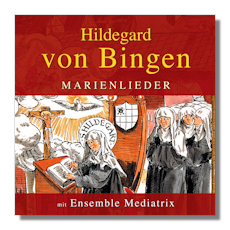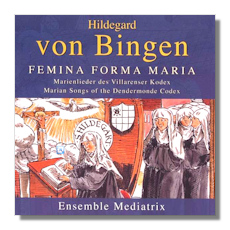
The Internet's Premier Classical Music Source
Related Links
- Hildegard Reviews
- Latest Reviews
- More Reviews
-
By Composer
-
Collections
DVD & Blu-ray
Books
Concert Reviews
Articles/Interviews
Software
Audio
Search Amazon
Recommended Links
Site News
 CD Review
CD Review
Hildegard von Bingen

Marienlieder
- Ave Maria
- O clarissima mater
- O splendidissima gemma
- Hodie aperuit
- Quia ergo femina
- Cum processit
- Cum erubuerint
- O frondens virga
- O quam magnum
- Ave generosa
- O virga ac diadema
- O tu suavissima virga
Ensemble Mediatrix/Johannes Berchmans Göschl
Profil PH10011H
Ensemble Mediatrix appears to have only one recording in the current catalog – this one. In several ways theirs is an unadorned performance of a dozen of Hildegard's antiphons, responsoria, hymns, and sequences. In the first place the ensemble, led by Johannes Berchmans Göschl, performs these items selected from the 58 such contained in the Dendermonde Codex as plainly as they were probably written – under the supervision of Hildegard in the twelfth century. We have no record of how much "life" Hildegard put or wanted to have injected into these (and for that matter the other 65 of her liturgical) works, how much embellishment and expressive flights of melody befitting her theological (self) confidence. Yet we do know that Hildegard was unconventional, broke with tradition, and believed that modal and melodic convention and protocol were there to be departed from in the interests of faith. So, paradoxically, to approach these lovely songs (none lasts more than nine minutes or so) without necessarily attempting to see them as Hildegard and her contemporaries did is certainly deviating as much from today's norm as is to bring decoration to them in the first place.

On top of this decision of conception, the style of the eleven-women Ensemble Mediatrix (Beatrice-Maria Weinberger has solos, which is itself "controversial"), is certainly not over-polished. Not to say that it's unfinished, or rough. Again, this may well have been how the music first sounded. This style is in welcome contrast to some of the more elaborate and over-wrought stylization. You can hear the singers draw breath at times, allow their lines to take their natural courses, let the harmonies emerge rather than be aimed at. This, too, is simply pleasing. Though it would seem unlikely that this one recording could set a new trend in this direction. Although the copyright for this CD is 2010, there are indications that it was made in 1996.
Each of the dozen songs here presented has its own appeal. None stands out. And in a way, that may have been what Ensemble Mediatrix is aiming for: a gentle, consistent and uniformly articulated impression of Hildegard's devotion. Its strength is additive, cumulative, quietly confident that multiple views on the same divinity merely confirm its solidity. Less is more.
Codex 9 (The Villarenser codex) originates in Dendermonde, Belgium from around 1174/75. As are many of Hildegard's works, these are Marian songs, that is, in honor of the Virgin Mary. So they have the usual serenity. Yet here Ensemble Mediatrix has infused them with a closeness and familiarity that speaks less of adoration than admiration. This is not the usual approach – again – and has a restraint implicit in it that should please many listeners.
The acoustic on the CD is a little less reverberant than is usually the case with recordings of plainchant and early choral music. That makes a welcome change, too, as it allows us to concentrate on the music itself. There is nevertheless an appropriate distance between voices and listener. It's still somehow very real. Maybe this comes from the unadorned nature of Ensemble Mediatrix's singing. There is no booklet, background or introduction to the works presented on this rather short (55 minutes) CD. Just a listing of the dozen tracks with timings. The chances are that you will have (you certainly can find) all of these on other CDs. But, despite the shortcomings, it's good to have a new take on this wonderful music. Recommended with minor reservations.
Copyright © 2010, Mark Sealey.





















